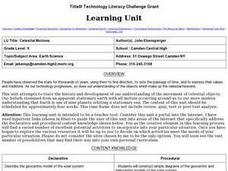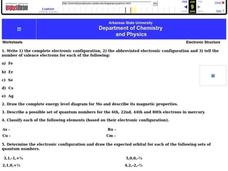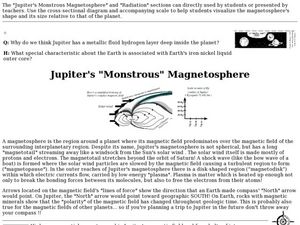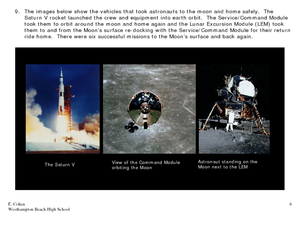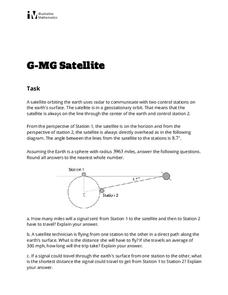Curated OER
Comets And Meteor Showers
Students fill in a diagram of a comet. They listen to a short lecture, view flash animation descriptions of comets and meteors and then use the presented information to complete a worksheet.
Curated OER
The Difference Between Comets, Meteors And Asteroids
Students use Venn diagrams to highlight the similarities and differences between comets, meteors, and asteroids.
Curated OER
What is Retrograde Motion
In this retrograde motion worksheet, students draw a diagram of the night sky by connecting dots to show retrograde motion. They compare retrograde motion to an optical illusion and answer questions about both.
Curated OER
Celestial Motions
Ninth graders complete a unit of lessons on the history of our knowledge of celestial objects. They conduct Internet research, plot the motion of a planet, construct a model of the sun's apparent motions, and create diagrams of the solar...
Curated OER
Comparing Eclipses
In this eclipses instructional activity, students will compare diagrams of a total solar eclipse with a total lunar eclipse. Students will complete 6 short answer questions based on these diagrams.
Curated OER
The Language of Anatomy
Students review the concept of anatomical directions. In pairs, they label each other according to those directions and label a diagram of themselves with the directions as well. They participate in a game of "Simon Says" to review the...
Curated OER
Motion Near Earth
In this motion worksheet, students will match 5 physics vocabulary words relating to motion with their definitions. Then, they will review 9 statements of different motion scenarios to determine is the statement is true or false....
Curated OER
Elements
In this elements worksheet, students write the complete electronic configuration and the number of valence electrons for elements. Students classify elements based on their electronic configuration. This worksheet has 5 problems to solve.
Curated OER
Honors Chemistry I
In this honor chemistry I worksheet, students use all available resources to answer each question given. Students apply their knowledge of light, quantum theory of light, Bohr's model, photoelectric theory.
Curated OER
Earth And Moon Path
In this science worksheet, students examine a diagram of the moon revolving around the earth in an elliptical orbit. Students answer 3 questions.
Curated OER
Our Solar System-- Fact File
For this space science worksheet, students read facts about the solar system. Students look at the diagram showing the position of the planets. Pluto is included as a planet here.
Curated OER
Quantum Physics
Students discuss the mass-energy relationship based on Einstein's work. They calculate the energy released in various scenerios and sketch diagrams for the Lyman, Balmer and Pfund Series. In groups, they discuss the role of photons and...
Curated OER
Jupiter's "Monstrous" Magnetosphere
Students explore Jupiter's magnetosphere. In this Jupiter lesson, students examine a diagram of the magnetic field that surrounds Jupiter.
Curated OER
Focus on Saturn's Fascinating Features
Students identify and discuss the characteristics of Saturn. They create a book using those characteristics. They also develop diagram to show Saturn and its moons.
Curated OER
Seasons
In this Earth's seasons worksheet, students study the diagram of the Earth's position as it orbits the Sun at four positions. Students then label the approximate date and season for the Northern Hemisphere at each stage. There is a word...
Curated OER
Chemistry Jeopardy
In preparation for an introduction to chemistry exam, play Chemistry Jeopardy with your class. The categories include molar relationships, phases of matter, atomic structure, chemical nomenclature, and scientific investigation. If the...
California Academy of Science
Kinesthetic Astronomy: Longer Days, Shorter Nights
A lamp, four globes, and some signs taped around the room are all you need to set up a solar system simulation for teaching how Earth's tilted axis creates the seasons. (Sticky dots are also needed, but not mentioned in the materials...
Curated OER
Solar System
Explore the solar system in detail, from it's origins to its components. Visual data gathered by actual space missions has been used to create the images and animations on each page of this stellar electronic book about the solar...
Curated OER
Oreo Moon Phases.
A guide to recreating all the phases of the moon out of Oreo cookies with varying amounts of cream filling. Although a simple activity, there are more involved questions requiring moon cycle and phase comprehension and leading...
Illustrative Mathematics
Satellite
Learners practice relating rules of trigonometry and properties of circles. With a few simplifying assumptions such as a perfectly round earth, young mathematicians calculate the lengths of various paths between satellite and...
American Museum of Natural History
Light Quest
Grab a partner and shed some light on light. A remote learning resource has scholars play a board game to answer trivia questions about light. They also read about how Einstein contributed to the understanding of light as both a wave and...
Curated OER
Cryosat Mission
Beginning with general information on satellites and seasons, concluding with polar ice and the Cryosat Mission, this worksheet gives your earth scientists an opportunity to conduct some research. Most of the assignment consists of short...
Shelby County Schools
Atomic Structure Worksheet
Teaching young scientists about atoms is no small task, but this series of worksheets will make it a little easier. From creating and labeling Bohr models, to identifying information provided in the periodic table of elements,...
Curated OER
Observation and Inference
Assess your young scientists' understanding of the difference between observation and inference with this 20-question multiple choice quiz. It reviews a variety of physics and astronomy concepts, such as solar eclipses and sunspots, the...



